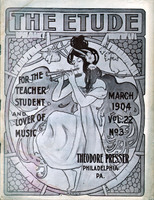BY ALBERT W. BORST.
The student's road to that eagerly desired haven, the home of the accomplished pianist, is usually tolerably clearly marked out. It is, indeed, often so very straight that one longs for some friendly bypath to relieve the daily tramp.
That there is considerable diversity in the music of modern composers for the piano is true enough; but it is not so much in the actual thoughts as in the manner in which they are expressed. Now the ordinary course of musical pedagogy for the piano eschews all pieces not written for that instrument; but the student, after emerging from the restraints of the conservatory, desirous of becoming in all respects versatile, cannot afford to ignore music originally composed for other instruments. If you cannot read a book in the original, you must take the most available translation.
The advantages of occasionally playing "arrangements" are more numerous than might at first be suspected. We meet with new and peculiar difficulties both in the reading and in the interpretation, the mastering of which is an aid in overcoming the more ordinary and legitimate ones. They may not lie well for the instrument; this awkwardness in the passage-work was for a long while objected to in some of Beethoven's sonatas; in much of Schumann's music the same is still laid to his charge. The latter composer is evidently aware of this charge, as he states that his music, like some handwriting, is hard to make out; but when once understood it could not be otherwise. Admitting, then, that some of the music we have in view is awkward, trying, unpianistic, that is no argument for giving it up without at least knowing something about its contents.
Perhaps the most useful and enjoyable of all arrangements are those of string quartets and quintets. The polyphony in some of these masterpieces, even to a player of Bach, appears in quite a new guise. The manner in which the different parts are constructed, the novel passages for the violins, the wide skips, the hard staccatos, etc.; all these come to us at the first deciphering as some new language. Symphonies, overtures, and other orchestral pieces are naturally better adapted for four hands, nevertheless good arrangements are easily obtained for two and will prove a pleasant recreation.
It is chiefly as a valuable auxiliary that we would seek to interest performers in the kind of compositions under notice. The amount of study requisite for such a type as Liszt's "Tannhäuser" would in our estimation be much more profitably employed on some original work for the piano. The majority of the arrangements we have been alluding to are only adapted for advanced performers; but there are many classics, especially slow movements from quartets and symphonies quite within the scope of the ordinary amateur.
A more difficult step is to take up some of the vocal scores of the oratorios, cantatas, and operas. To an accompanist such study becomes imperative. There are many good pianists who do not make a good showing when put before even an oratorio chorus. The enjoyment of digging out treasures from their ore, is one that increases with practice. Added to which the player gets a practical insight into musical history which he could not otherwise procure. It should be to him, quite as important to know characters like "Elijah," "Judas Maccabæus," and "Samson" in their musical setting, as in their mere historical garb.
All will acknowledge the great treat they experience in listening to chamber music well rendered. To hear it after one is familiar with the score adds immensely to the charm. This is, indeed, necessary if we are to get intellectual and not merely sensuous gratification out of the music. Still further: he who would venture to criticise any new work without preliminary examination of the score is apt to be rated as one who might "pervert the prophets and purloin the Psalms." To those residing away from a large city, works like Beethoven's "Septuor," "Serenade," etc., would be dead letters were it not for arrangements.
Consult the shelves of our leading libraries and you will find a certain few new novels sought after by an overwhelming majority of readers. So it is in pianoforte literature; we get inoculated with the same matter. In both the cases of the reader and of the pianist much, very much, can be unearthed from older stock which would afford more permanent profit and pleasure as well.
We want, then, to advance, as Herbert Spencer would put it, "from the homogeneous to the heterogeneous." In plainer words, we would make the player a better musician—the musician a better player.



